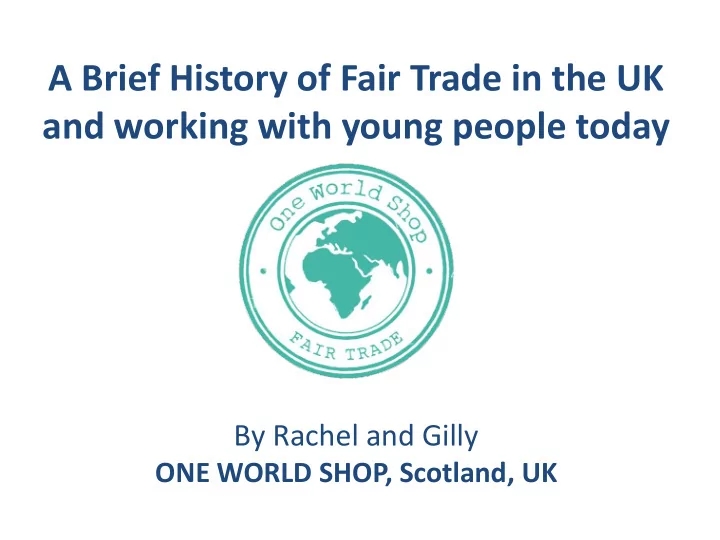

A Brief History of Fair Trade in the UK and working with young people today By Rachel and Gilly ONE WORLD SHOP, Scotland, UK
1790’s – Slave-free Sugar For over 300 years, European countries forced Africans onto slave ships and transported them across the Atlantjc Ocean to work in plantatjons in the Americas. In 1791 , afuer the UK Parliament refused to abolish slavery, thousands of fmiers were printed encouraging the boycotu of slave sugar. Sales dropped by almost a half. In an early example of fair trade , shops began selling sugar grown in India, guaranteed to have been produced by 'free men’. 1807 : The slave trade was abolished in the UK
1800s – 1900 in UK • Considerable shifus around social justjce within UK – Shifus of power bases & individual empowerment – Religious shifus – missions (relief vs evangelism) / role of women / church & monarchy • Context of economic trade low’s & highs – Start of the fall of the Britjsh Empire – Mass rise in unemployment – rural displacement – Poor laws (1600 & 1830’s) – Utjlitarianism of labour – industrial revolutjon • About the individual – Votes & voices for all, a new politjcs, gentry & gender – Class charters – Deserving & underserving poor
Fair Trade in UK 1948 -1979 1948 : Oxfam opened its fjrst Charity Shop in Oxford to raise funds for poverty-stricken countries, the shop is stjll open today 1964 : Oxfam starts selling crafus and cards made in developing countries 1974 : In response to the war in Bangladesh, Tearcrafu began, importjng jute handicrafus from destjtute widows, to sell in Britain 1979 : Traidcrafu started, supportjng handicrafu productjon as a response to fjghtjng poverty in Third World countries. It was known as an Alternatjve Trade Organisatjon (ATO)
UK Politjcal landscape in 1980’s-90s Changing identjtjes – social justjce gets lost • Antj-Thatcherism –demise of the Trade Unions and Britain’s long standing labour movement • Ending of ‘old’ politjcs about ‘capital’ labour / trade / class gives way to new agenda’s (‘me’, culture, sexuality, the environment, radicalism • New justjces & prioritjes: cheap knowledge - rise of the web / types of informatjon /local global / supply chains / price points • Modernity vs moral regulatjon – where does social justjce and fair trade fjt in?
1980 - 1999 1980s : Small independent shops, ofuen linked with churches, began to sell Traidcrafu products 1982 : One World Shop was started 1989 : IFAT (now WFTO) was formed 1992 : Fairtrade Foundatjon began with the aim of developing a MARK for Fair Trade products to stand out in supermarkets 1994 : First FT Marked product: Maya Gold choc 1995 : BAFTS was set up. Fairtrade products are stocked in all UK supermarkets. 1998 : FT sales reach £14 million, Divine chocolate was formed
2000 - Today 2000 : The fjrst Fairtrade bananas are introduced in over 1000 Co-op stores. 2001 : The fjrst 'Fairtrade Town' in the UK is established. 2005 : FT Marked products range rise to 700 items 2008 : Wales becomes the fjrst Fair Trade Natjon. Sales of FT products in UK: £712 million 2013 : Scotland achieves Fair Trade Natjon status 2014 : Sales of FT Products in UK: £1.67 billion
The One World Shop
Who are we? A Social Enterprise with charitable status 8 paid stafg, 20 volunteers Volunteer Management Commituee Retail shop with extras Wholesale service, FT tea and cofgee delivery service to local offjces Stalls for churches and community groups Educatjon programme in schools
Working with young people Why is it important? • Future actjvists, campaigners, buyers, politjcians, change-makers What are the challenges? Student debt, unemployment, lack of engagement, austerity, not relevant to lifestyle
We work with young people – in churches
We teach Fair Trade in Schools
We provide paid placements for unemployed young people
We ofger internships for University students
We do events with local black and ethnic minority communitjes
We engage young people in campaigns with our local politjcians
But what’s the future? • Are our young adults switching ofg? Has FT lost it’s edge and become too mainstream? • Climate change challenges • Global/local issues - FT’s carbon footprint • How can Trade Justjce and Fair Trade be relevant for the new generatjon? • We’re on an evolutjonary process, where are we going next?!
Recommend
More recommend